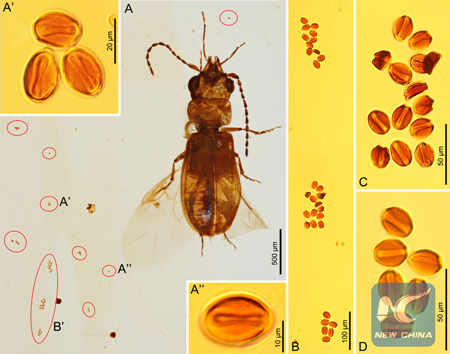

Cycad pollen grains associated with C. cycadophilus. (Xinhua/CREDIT: NIGPAS)
Chinese researchers have found a pollinator of early gymnosperms prior to the rise of flowering plants, lending clues to complex biology of those plants with naked seeds.
A study published on Thursday in the journal Current Biology described a new mid-Cretaceous (99-million-year-old) boganiid beetle with specialized pollen feeding adaptations.
The findings suggested an ancient origin for beetle pollination of cycads long before the rise of flowering plants, according to Cai Chenyang with the Nanjing Institute of Geology and Palaeontology of the Chinese Academy of Sciences.
Plant-insect interactions, one of the critical bedrocks for modern ecosystems, are largely dominated by insect-angiosperm relationships owing to the hegemony enjoyed by flowering plants since the Late Cretaceous. Gymnosperm-insect interactions, on the other hand, are far less well understood, particularly in terms of pollination modes.
Unlike modern wind-pollinated conifers and Ginkgo, cycads are unusual in that they are an ancient group of gymnosperms pollinated by insects, such as beetles and rarely thrips.
The researchers discovered a new genus and species of boganiid beetle, preserved with many tiny cycad pollen grains and possessing specialized mandibular patches for the transport of cycad pollen.
The fossil represented the earliest definitive fossil evidence for cycad-insect interactions, and illuminated the ancient history of the establishment of complex entomophily in cycads. Entomophily is the form of pollination whereby pollen or spores are distributed by insects.
It also indicated a probable ancient origin of beetle pollination of cycads at least in the early stage of the Jurassic, some 176 million years ago, long before flowering-plant dominance and the radiation of their pollinators such as bees and butterflies later. (Xinhua)

86-10-68597521 (day)
86-10-68597289 (night)

86-10-68511095 (day)
86-10-68512458 (night)

cas_en@cas.cn

52 Sanlihe Rd., Xicheng District,
Beijing, China (100864)

